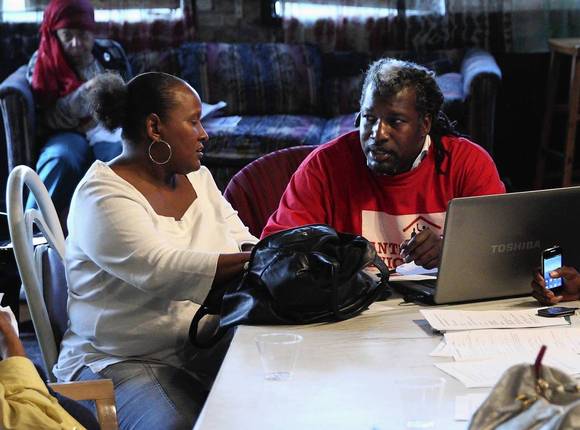Since 2010, the Chicago Anti-Eviction Campaign has taken over nearly 30 abandoned South and West Side residences, rehabbed them and moved in homeless families.
Willie J.R Fleming, a longtime housing rights activist and co-founder of the campaign, said the group can do this because of an exemption in the state criminal trespass law — even though the group`s interpretation of it hasn`t yet been tested in court.
It`s a pretty radical approach. But drive through Englewood, Auburn Gresham, Park Manor and Greater Grand Crossing, as I did last week with Fleming, and you`ll see how the foreclosure crisis has decimated swaths of city blocks.
Once-lovely buildings stand boarded up and empty. Too many have been gutted, stripped of items like copper wire, aluminum ducts and hot water tanks. Others are now havens for criminals. You quickly understand that something radical is needed.
Here`s an edited version of a conversation I had with Fleming before and during our road trip.
Q: The news coming from the South and West sides is often pretty grim. What does Chicago look like from your vantage point?
A: I see the displacement of black people and the disinvestment of black communities. But I also see grass-roots organizations coming together to tackle the blight and violence. The news will have you believe we`re hostages in our own communities. But the reason why the Anti-Eviction Campaign was able to take over homes around Chicago is because residents are looking for an answer to the vacant properties on their block. They want to change the condition of their community.
Q: And they believe your organization can help foster that change?
A: A lot of people say we take over houses, but we don`t do anything without community participation. People know that vacant houses are threats because rapists can drag kids in there. Drug dealers turn them into drug houses, and guns can be stashed there. We`ve always depended on volunteers to do the rehab work, and often they`re neighbors who live on the block who are just tired of the eyesores.
Q: What type of properties do you take over?
A: Most of them have been vacant for three to five years. If we`re not rehabbing them, we`re boarding them up so they don`t fall to criminals.
Q: Interestingly, some organizations don`t want you guys boarding up houses.
A: They feel taking over houses is great — but when we board them up, they say, You`re doing the job of the bank. They feel we should be taking the boards down. But they don`t know the impact an unsecured building can have in our community.
Q: What about people who say you`re breaking the law?
A: We say, look at the law: If a property has been abandoned for at least one year and/or property taxes haven`t been paid for at least two years, you can go onto that property to beautify it. Banks have allowed these properties to become run down, and how would it look for them to come after us for beautifying their property?
Q: But what about moving people onto the premises?
A: There`s the necessity defense that says we do this to keep these houses from being taken over by criminals and to keep the neighborhood safe. After the demolition of the city`s public housing high-rises, we said we would do what was morally right to provide housing and we`d work in a way that was reminiscent of our forefathers involved in the civil rights movement. In the Jim Crow South, it was illegal for blacks and whites to go to school together, to sit together at a lunch counter. But they broke the law to force the government to change the law to be morally right.
Q: What happens if the vacant property is already a crack or gun house?
A: We train our canvassers to engage the young men on the street corners. We explain who we are and tell them that we can house their relatives and friends and nobody goes homeless.
We say, If you know somebody who`s running a drug or gun house, tell them to clear out because we`ll be back tomorrow and we`ll call 911. They start to tell you about the history of the properties. They know the back story.
We also say, If anybody wants to learn a trade, we can teach you. We can`t pay you, but we can feed you. We`re not just moving a family into a house. It has to be repaired, so we`re also training young people to put up drywall, install floors, paint and fix roofs. If you give people a skill set, they have a sense of worth.
Q: Where do you get money for this?
A: We have fundraisers, but you`d be surprised by how many people donate their time, cans of paint and other building materials.
Q: You`ve said you view housing as a human rights issue. Explain that.
A: From 2004 to 2009, our work focused on public housing and the homeless. But, because of the foreclosure crisis, we felt we had to expand the fight to homeowners who have lost their property.
We believe people deserve shelter according to Article 25 of the United Nations` Universal Declaration of Human Rights. Every man, woman and child has a right to adequate housing, and we believe government should provide it.
Q: Is that in cases where people can`t provide it for themselves?
A: That`s right. In those cases, we are enforcers of human rights to housing.
Photo: J.R. Fleming, top, helps residents deal with Foreclosure Thursday at the offices of the Anti-Eviction Campaign on the South Side of Chicago.














